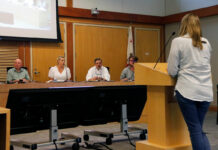At least that was the question until it rained last week. Till then, the fish were holed up in pools of the lower Russian River, unable to go on their spawning runs because there wasn’t enough water in the river to allow it. I expect the rushing brown water from several creeks and tributaries has raised the river flow enough for the fish to be on their lusty way.
Before the rains came, this year’s “class” (That’s what fish officials called it.) of steelhead and salmon was in jeopardy. The agency in charge banned fishing on north coast rivers and streams, but then, in the workings of bureaucratic systems, the ban couldn’t take effect for some weeks. And this gave rise to a moral dilemma.
Many fisherpersons welcomed the ban and voluntarily gave up their sport even though it was still legal to go fishing — a noble attitude.
However, I’m not going to jump all over those who said, “Heck sakes, the fish are there, let’s go catch ‘em.”
Some years ago, I fished for steelhead myself. I got miserable, wet, and cold, just as one is supposed to do, but never, ever, did I catch one. And I was not alone. Hardly anyone caught a steelhead in those days. The fish were even scarcer then than they are today.
Thanks to conservation efforts, steelhead and salmon runs have improved a bit, but, I would guess, the vast majority of fisher folks never catch one of these marvelous fish. So, if numbers of hungry steelhead are trapped in pools, I can understand why long-frustrated anglers might want to go fishin’.
Still, the moral question is there. Like many moral questions, it has to do with deferring immediate gratification in favor of a more abundant future. We humans are not very good at this, especially when it comes to protecting our natural environment. If we were, there would be huge runs of steelhead, and some species of salmon would not be on the endangered list. Nor would there be a large human component to global warming, and pollution from the smokestacks of China would not be wafting upon the California coast.
So, all right, now I’ve fallen into that old preachers’ habit of taking things to ever larger contexts. I start talking about fishing for trapped and endangered fish, and right off I’m pushing the matter to include the evolution of the planet or the will of God, which may be much the same in this case.
It’s pretty clear that our planet will one day be unable to sustain human life in its present manner, and, given our ongoing abuse of the environment, that day may come a generation or two hence. Whether we call it the revenge of nature or the wrath of God hardly matters. Fail to keep the commandments and you court disaster whether those commandments are considered divine prohibitions or natural laws.
But back to fishing, for heaven’s sake. Nowadays, almost all the worthwhile trout fishing in this country, and that can include steelhead and salmon on their fresh water runs, is catch and release. Because this is so, the great sport of fly fishing can continue to bring its satisfactions to the blessed few.
Fly fishing is a beautiful sport. The light rod, the long cast of a looping line, the fly settling on the water looking natural and inviting, and then the fish, thoroughly deceived by skill and cunning, smashes into the fly. You raise the tip of the rod, set the barbless hook, and the brief but exciting battle is on. Then you bring the fish in, take its picture, slip the hook out of its mouth, and let it go to fight another day. It all seems so wonderful.
But the last time I did this was on a great trout stream in Utah. Every fish we caught had chunks of lip missing from former encounters with barbless hooks. Some even had hooks still in their mouths, the feathers and twine of the artificial fly still showing. And the fish that lost a scale or two in the struggle were likely to succumb to algae or bacteria from which they no longer had protection.
And so the beauty which is fly fishing has its own moral question. Is it right to damage a beautiful creature for the sport of it? That’s probably all the context we need for this discussion. Ah yes, to fish or not to fish? I have to admit, I hate that question.
Bob Jones is the former minister of the Guerneville and Monte Rio Community Churches.








